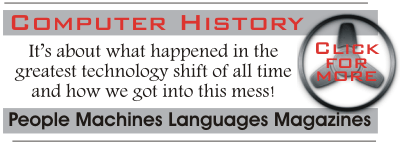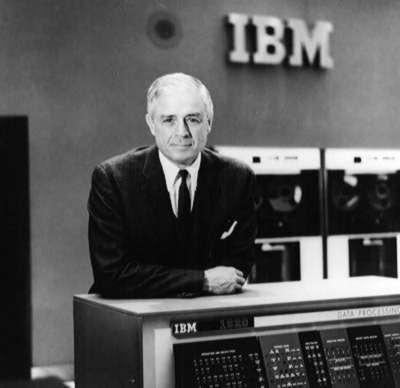| Thomas J Watson Jr and the IBM 360 Fifty Years On |
| Written by Harry Fairhead | |||
Page 1 of 2
It is difficult to appreciate how important a role IBM played in the life of the computer user of the 60s and 70s. If you think that IBM was simply the company that designed the PC so that every other company could clone it then think again - IBM was the start of modern computing. IBM had been a major player since the days of ENIAC and before. If you think that Microsoft or Google has always been the computing monolith, threatening domination of the whole market, then it is worth knowing that IBM held that position for a lot longer. The main architects of this domination were the Watsons. Thomas J Watson Senior took IBM to the brink of the electronic era but the man who took it all the way was Thomas J Watson Junior.
Thomas J. Watson Junior (1914-1993)
Thomas J Watson Junior (Tom) was the first son of four children born to Jeanette Watson. Being the son of the first boss of IBM gives you certain advantages and many disadvantages. Watson Senior was a patriarch who expected to be obeyed and occasionally had a temper to match. He expected much of his children and was curt and unforgiving. He lectured the boys and often withheld rewards as he might from a salesman not meeting his quota. No matter what the benefits of wealth and relative security might have been the treatment must have built up a store of resentment and a craving for success. For most of Tom's childhood the Watsons lived in Short Hills, a well-to-do, ultra-respectable New Jersey town. Tom became a Boy Scout but again learned a hard lesson when his father financed a summer trip abroad but he had to stay home because he failed to meet his Eagle Scout Badge requirements in time. At age five young Tom was taken to a sales convention and by the time he was twelve he was on the program, making short speeches on salesmanship which his father thought were very good. Like his father Tom had little interest in books and learning but he had the benefit of a good education via private schools. A mediocre student he managed to enter Brown University. He lacked his father's self confidence but Dr Ben Wood, a friend of Watson Senior, did his best to look after Tom - understanding the pressures that Tom was under and his disdain for the unpractical courses that the University provided. The strange turnaround occurred when Tom graduated. Watson Senior wrote him a letter that seems to be an attempt to rewrite family history. His father said that he was looking forward to Tom's help and counsel in running the business. After this event Tom found it difficult not to do well - whether it was cause and effect we can only speculate. At the IBM trainee school he quickly became class president - even though he still had a reputation for drinking, something strictly against the company ethos. The real surprise is that after having become a regular drinker at Brown University he continued and even developed it to become something of a Manhattan playboy in open rebellion against his father. A further surprise is that his father suspended his sense of fair play, so openly displayed in the past, and allowed him to get away with it. As an IBM salesman his record was brilliant - a member of the 100% club in the his first year. The following year he made his quota at the end of the first day of the year. He advanced through the ranks at a rate that, even taking into account his performance, still might have had something to do with his father. Tom's career at IBM came to an abrupt halt with the start of the Second World War. Watson Senior put IBM's manufacturing capabilities at the disposal of the government. Soon factories that were producing tabulating machine were producing machine guns. A patriotic gesture but IBM grew into a huge company from the amount of work put its way - it factory space doubled and its workforce tripled. Tom joined the US air force and became a pilot. For much of his future life he would think of himself as a "flyer". In three years he rose to the rank of major, which his father thought should have been major-general.Even when he was promoted to lieutenant colonel his father almost announced it as lieutenant general. His principle job was as an air chauffeur for the top brass but it took him into the heart of the war. Clearly his father was very proud of his achievements. His time with the air force gave him a new sort of freedom - he did not have to go back to IBM. A career as a pilot was very obviously a new choice that the ending of the war gave to him. He had reformed and was no longer the heavy drinking playboy. At 31 he left the air force, married, and, more sure than ever before that he was up to the job, he returned to IBM.
The family firmThe time when both Watsons, father and son, ruled IBM must have been difficult. A father and son relationship as awkward as theirs couldn't have been an ideal working relationship but Tom did have the edge, being the only person able to stand up to Watson Senior and deal with his temper. At 35 he became president of the World Trade Corporation - the IBM overseas division. Tom Watson Junior had a different management style to Watson Senior. The company had grown accustomed to sales rallies, company barbecues and the like. It was full of mottoes, company songs and a cosy community spirit. Tom thought all of this juvenile. Indeed the company song books were a particular embarrassment to Tom - "Our products now are know in every zone, our reputation sparkles like a gem", from Ever Onward IBM. He wanted people with ideas, daring and imagination. He saw IBM as stuck in the past and quite unsuited to the technological age it was pioneering - and it was his father who was much of the problem. One day in 1955 Watson Senior appeared unusually early and unannounced in Tom's office. An argument followed about whether or not IBM should accept the anti-trust decree that had resulted from its near domination of the market. Old Watson did not want to play ball with the government and Tom saw this as the company's only choice. He tried to explain to his father that the world and IBM was a different place. He left his father and went to the federal court house and unilaterally signed the decree. A messenger found him and handed him a handwritten note which was laid out in the manner of a sales pep talk slide:
Tom Watson was at last the boss.
<ASIN:0553070118> <ASIN:007162645X> |
|||
| Last Updated ( Wednesday, 09 April 2014 ) |


